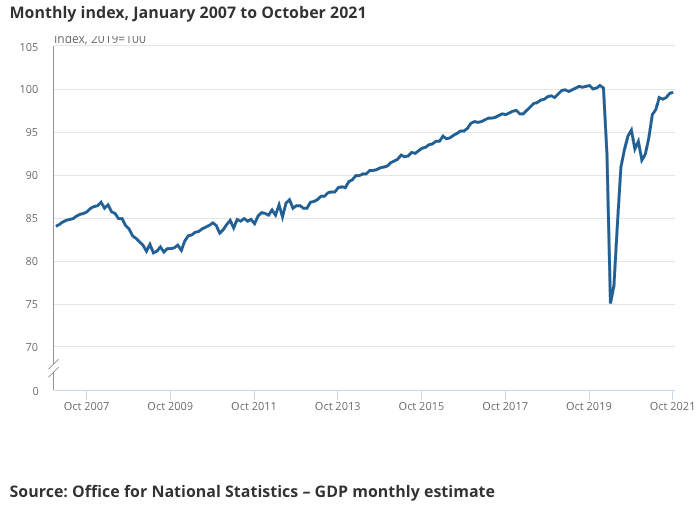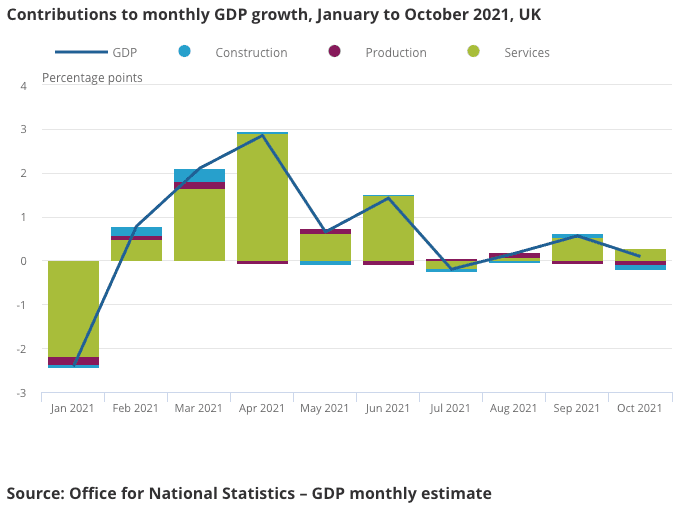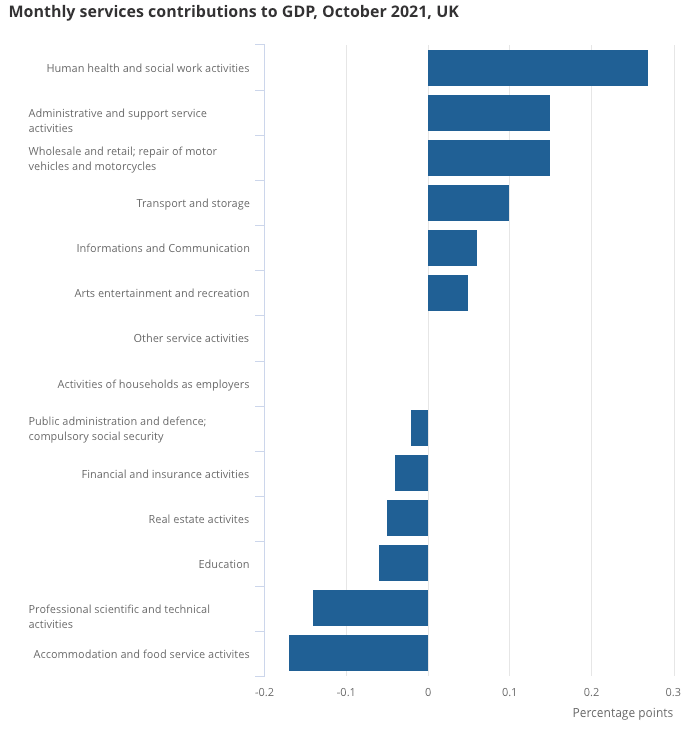Plan C to Tank Economic Activity as Oct. GDP Flatlines
- Written by: Gary Howes

Image © Adobe Images
The UK economy hardly grew in October and looks set to contract in December and January as the government squeezes activity through the reimposition of Covid restrictions and reports emerge of even tighter restictions being imposed under a so-called Plan C.
All sectors of the economy disappointed - save for medical related sectors - in October as GDP grew just 0.1% month-on-month said the ONS.
This was well below the 0.4% expected by the market and the 0.6% recorded in September.
Economic growth slowed from 5.3% to 4.6% in the third quarter when compared to the same period a year prior, which is well below the more robust 6.6% the market anticipated.
"The disappointing GDP figure offers a complicated picture with supply chains issues, worker shortages and inflated prices continuing to hamper productivity. These have all led to weakness in key areas such as construction, manufacturing and hospitality and an extra worry is that these figures come prior to the latest winter coronavirus restrictions which risk constraining activity further," says Mike Owens, Global Sales Trader at Saxo Markets.
Construction output was particularly disappointing coming in at -1.8% m/m in October, below estimates for growth of 0.2% and representing a dramatic slump on September's reading of 1.3%.
The index of services - a measure of the economy's largest sector - read at 1.1%, down from the previous month's 1.6% and below expectations for a reading of 1.2%.
The ONS said much of the upside in the October data came from rising demand for GP appointments and a continued recovery in air travel.
But air travel and much of the services sector faces contraction over coming weeks following the reintroduction of strict travel rules in the UK.
And reports that further restrictions are likely to be imposed - a so-called Plan C - will only add to concerns the economy is headed for a contraction.
The government is said to now be planning even tighter restrictions to tackle the spread of the Omicron variant.
The Daily Mail reports new measures to be introduced in the New Year include hospitality venues being required to collect the contact details of all customers.
The requirement will serve a significant blow to the country's beleaguered services sector which is set to see activity decline from Monday when a work from home order is enacted.
Even before the imposition of additional controls Pantheon Macroeconomics anticipate output in the food and accommodation services sector to fall 10% between November and January, while output in the arts, entertainment and recreation sector and in the transport and storage sector both fall by about 6% on the same basis.
"Output in most other sectors, however, should continue to rise slowly, given that businesses have learnt to adapt to home-working," says Samuel Tombs, Chief UK Economist at Pantheon Macroeconomics. "Output in the healthcare sector might rise further as vaccinations and testing increase."
"A combination of tighter restrictions, reduced consumer appetite to socialise, and more limited government support, would deliver a noticeable hit to January's GDP numbers," says James Smith, Developed Market Economist at ING.
Above: "Services were the main contributor to GDP’s 0.1% growth in October 2021." - ONS.
Industrial Production contracted 0.6% m/m in October, disappointing a market that anticipated growth of 0.1%.
Manufacturing Production stalled at 0.0% m/m in October, down on September's growth of 0.1%, where the market had looked for growth of 0.1%.
The data only adds to the view that the Bank of England will unlikely raise interest rates in December.
"A hawkish BoE policy turn may take longer to materialise partly because of the potential for a negative growth shock from Omicron. Our base case is for the BoE to begin normalising the policy rate in February 2022. In the meantime, GBP/USD faces additional downside risk," says currency strategist Elias Haddad at CBA.
But David Page, Head of Macro Research at AXA Investment Managers, says the Bank of England has signalled pretty clearly that some tightening of monetary policy will be required in the UK’s capacity restrained rebound.
"Human health and social work was the main contributor to growth in services output in October 2021, with a continued rise in face-to-face appointments at GP surgeries in England" - ONS.
"Beyond the political optics, we see merit in making the first 0.15% increase next week, while explaining that any further tightening will depend on future developments in the virus," says Page.
Looking ahead Pantheon Macroeconomics forecast UK GDP to contract by 0.1% month-to-month in December and January.
But it will likely return to strong growth in the spring once the Omicron wave dissipates.
"There are some signs of business confidence - activities of temporary recruitment agencies grew rapidly (6.7%) reflecting strong labour market performance and households are booking holidays (up 30.4%)," says Jonathan Gillham, Chief Economist at PwC UK.
"Demand though remains strong and there’s clearly capacity for much stronger growth going forward once efficiency improves," says Saxo Bank's Owens.






